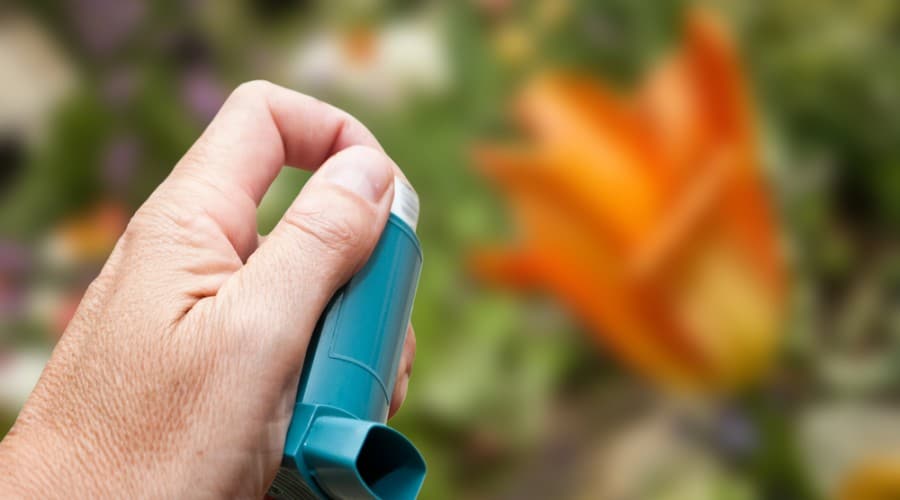HOW TO ENJOY UNFORGETTABLE HOLIDAYS WHEN SUFFERING FROM ASTHMA ?
Asthmatic people must be careful when traveling, especially if they go to a distant destination totally different from their home country. Indeed, the radical environment and lifestyle changes could quickly lead to asthma crises, as well as all the stressful situations they may experience. However, following some simple advice concerning the medical kit they should carry, the vaccinations they should get, the different modes of transportation, the choice of accommodation and their country of destination is enough for them to enjoy peaceful holidays, without any major health issue.
PACKING A COMPLETE MEDICAL KIT
When traveling, asthmatic people must carry a medical kit containing basic medicines, as well as their usual specific treatments and medical supplies for asthma, such as inhalers, bronchodilators and anti-inflammatory medicines. A peak flow meter is also required to evaluate any potential respiratory trouble and to adjust their treatment if necessary. Asthmatic children will need a spacer device with their inhaler. If they are allergic to bee, wasp or ant bites, it is essential that asthmatic travelers bring corticosteroid in injectable form and adrenaline hydrochloride, in case of severe allergic reaction. In addition, it is important that they carry a document summarizing all their known allergies and what to do in case of serious crises.
The aerosols, tablets and injecting medicines needed in case of asthma crisis, as well as the necessary medical devices, must be easily accessible at any time. In the plane, they must be placed in the hand luggage.
Before their departure, asthmatic travelers must see a doctor, who will prescribe them all the specific medicines they need in sufficient quantities. The practitioner will also provide them a document summarizing their health status, and a prescription for their treatment and medical supplies. These documents should be translated in English if they are written in another language. This will be useful to go through the security controls in the airport, and if they need to buy medicines or medical supplies while traveling.
GETTING THE ADEQUATE VACCINATIONS
Before traveling, asthmatic people must seek advice from a doctor regarding the specific vaccinations they may need, and if these vaccinations are compatible with their health condition. Being correctly protected against infectious diseases will help them to avoid medical issues which may be worsened by asthma. It is important to note that people allergic to ovalbumin (egg protein) can not get vaccines against yellow fever, flu and tick-borne encephalitis. Elderly asthmatic travelers should be vaccinated against pneumococcal disease.
TAKING PRECAUTIONS REGARDING THE MODE OF TRANSPORTATION
Whether they are traveling by train, by plane or by car, asthmatic people must remain careful of ventilation and of the sudden change of temperature caused by air-conditioning. In planes, they should use adjustable air vents with caution. In trains, they must be aware of animals, cigarette smoke and the ventilation coming from the bottom of the windows. When traveling by car, they must make sure the vehicle has been correctly dedusted prior to their departure, especially before a long ride. They should be aware that long travels by car may provoke serious asthma crises.
BEING AWARE OF THE HIDDEN DANGERS OF THEIR ACCOMMODATION
Asthmatic travelers must be especially careful when staying in resorts or hotels opened only seasonally, as if they arrive at the beginning of the season, the premises may not have been deeply cleaned for a while. As a result, the rooms are likely to be full of dust and allergens. Moreover, they must be aware that some hotels have old wooden floors, which are havens for dust mites. When making their reservation, asthmatic people should ask for the complete dedusting and dehumidification of their room prior to their arrival. They ought to be careful about the bedding used in their accommodation, especially if it comprises feather pillows and comforters. It is safer for them to bring their own anti-dust mite cover and synthetic pillow, as well as an insecticide aerosol.
GETTING WELL INFORMED ABOUT THEIR DESTINATION
Asthmatic travelers allergic to pollen must avoid traveling to the countryside in temperate climates (especially between May and August). People sensitive to animal hairs should not visit zoos and farms. As equidae are highly allergenic, places where horses are found, like stud farms, ranches and equestrian centers, must also be avoided. Caution should be taken concerning strong winds, as allergenic particles can be air-carried on several kilometers.
Before their departure, asthmatic travelers should be aware of the national emergency numbers used in their country of destination, as well as of the phone number and the address of their embassy, which could advise them local doctors and specialists if they need medical assistance while traveling. They must make sure they are fully covered by a health insurance including repatriation while traveling, and always carry their certificates of vaccination and medical prescriptions.
To avoid stressful situations which could lead to an asthma crisis while traveling, they ought to always be careful about what they eat and drink, to prevent diarrhea-like diseases. They must also prevent motion sickness. If possible, they should avoid frequenting very hot areas, high altitudes (above 2 500 meters), extremely cold places and zones affected by strong winds.

